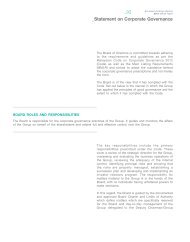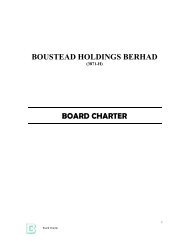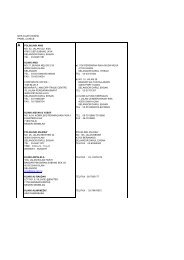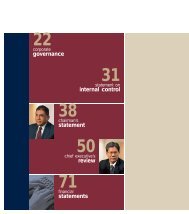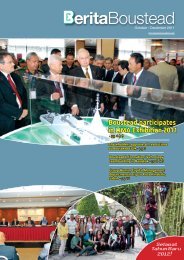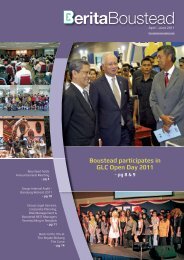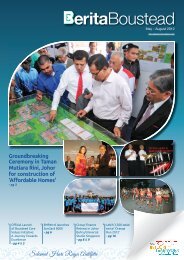Directors - Boustead Holdings Berhad
Directors - Boustead Holdings Berhad
Directors - Boustead Holdings Berhad
Create successful ePaper yourself
Turn your PDF publications into a flip-book with our unique Google optimized e-Paper software.
Accounting Policies<br />
(i) DEVELOPMENT PROPERTIES AND PROPERTY DEVELOPMENT IN PROGRESS (cont’d.)<br />
84<br />
(ii) Property development in progress<br />
Property development in progress comprises cost of land currently being developed together with<br />
related development costs common to the whole project and direct building costs, and less<br />
anticipated losses, if any. Development revenue and expenses are recognised in the income<br />
statement when the financial outcome of the development activity can be reliably estimated. Where<br />
the outcome cannot be reliably estimated, revenue is recognised to the extent that costs are<br />
recoverable, and costs on properties sold are expensed in the period incurred. The excess or<br />
shortfall of revenue over billings to purchasers is classified as accrued billings within trade<br />
receivables or progress billings within trade payables respectively.<br />
(j) REVENUE RECOGNITION<br />
Revenue is recognised to the extent that it is probable that the economic benefits will flow to the Group<br />
and the revenue can be reliably measured.<br />
Revenue from the sale of goods and services is recognised when the goods and services are delivered.<br />
Revenue from property development and other long term contracts is recognised on the percentage of<br />
completion method by reference to the percentage of actual construction work completed. Rental income<br />
represents the invoiced value derived from the letting of properties, while finance charges from hire<br />
purchase activities are recognised over the period of the hire purchase contracts in proportion to net<br />
funds invested. Revenue from rental of hotel rooms, sale of food and beverage and other related income<br />
are recognised on an accrual basis. Tuition fees are recognised on an accrual basis whereas nonrefundable<br />
registration and enrolment fees are recognised when chargeable.<br />
Dividends from Subsidiaries, Associates and other investee companies are recognised in the income<br />
statements when the right to receive payment is established. Interest income is recognised as it accrues<br />
unless collection is doubtful. Sales and other revenue earned from intra-group companies are eliminated<br />
on consolidation, and the revenue of Associates is excluded from Group revenue.<br />
(k) INCOME TAX<br />
Income tax on the profit or loss for the year comprises current and deferred tax, and is recognised in<br />
the income statement except to the extent that it relates to items recognised directly in equity, in which<br />
case it is recognised in equity. Current tax is the expected amount of income taxes payable in respect<br />
of the taxable profit for the year and is measured using the tax rates that have been enacted or<br />
substantively enacted at the balance sheet date.<br />
Deferred tax is provided for using the liability method, on temporary differences at the balance sheet date<br />
between the tax bases of assets and liabilities and their carrying amounts in the financial statements. In<br />
principle, deferred tax liabilities are recognised for all taxable temporary differences and deferred tax<br />
assets are recognised for all deductible temporary differences, unused tax losses and unused tax credits<br />
to the extent that it is probable that taxable profit will be available against which the deductible<br />
temporary differences, unused tax losses and unused tax credits can be utilised.



